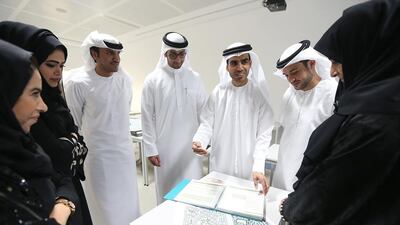ABU DHABI // Master’s students at Khalifa University are working with the Urban Planning Council on the emirate’s first safety and security manual project. As a result, the capital’s high-profile public buildings will undergo a security overhaul aimed at crime prevention.
The students’ work in the security industry, such as at the Ministry of Interior and the police, and are now part of the first generation to establish the region’s first domestic security policy.
“This is the first time that the new safety and security manual developed by the Urban Planning Council (UPC) has been integrated into a university course for training future security professionals in the UAE,” said Dr Athol Yates, assistant professor at the university’s Institute for International and Civil Security.
The manual is not only world-class in its content, it is also written specifically for the Emirati culture.
“The manual and the UPC’s support have provided students for the first time the actual government guidelines on how to implement crime prevention, where in the past we had to use foreign guidelines which had limited applicability to the UAE.”
There have been field trips and students are being taught how to modify buildings and their surroundings to prevent crime and improve safety and security. The students have practised applying crime prevention methods for high-profile buildings such as hotels and museums, as well as residential, communal and business buildings.
UPC staff have led a three-week bloc of training to teach physical security evaluation, security risk management and security risk mitigation techniques.
Dr Yates said the university’s collaboration with the UPC was to ensure students got practical skills rather than purely academic ones.
“The students are learning from security practitioners who are actually undertaking security risk reviews within Abu Dhabi. Abu Dhabi Urban Planning Council requires all new buildings in Abu Dhabi to apply this manual, though many will now be retrofitted at great cost to accommodate the new guidelines.
“In the past we may have used foreign documents on how to do security risk assessments, but having a local manual that reflects Emirati culture results in a much better outcome for security in the UAE. ”
Sheikha Al Yammahi, 31, began the course in February.
The Emirati from Ras Al Khaimah works with the information and communication technology team at Emirates Nuclear Energy Company, and said the course has been fascinating so far. Possible threats addressed included cybersecurity and terrorism.
“Abu Dhabi is growing and especially in tourism and the investment,” she said. “People come here because the UAE is famous for its safety so it’s important that we work to protect that.”
The local and cultural slant is of particular relevance.
“I was surprised to see these things in the manual,” she said, “like the fact that Emiratis don’t like to live too close, to have their houses overlook each other or to face a main road. They value privacy, and concepts like this have been very much included in the manual.”
Saif Al Khafili, 32, is a senior associate planner at the UPC. He said the course offers new skills which will be beneficial for his career.
“There are many new agencies starting up now focusing on this area,” he said. He is taking the course now that the law requires all buildings to abide by the manual’s planning legislation.
There will also need to be consultation on old buildings that must undergo retrofitting.
“The critical buildings and crowded places such as stadiums and malls will have to be assessed to see what kind of safety changes are required.”
mswan@thenational.ae

